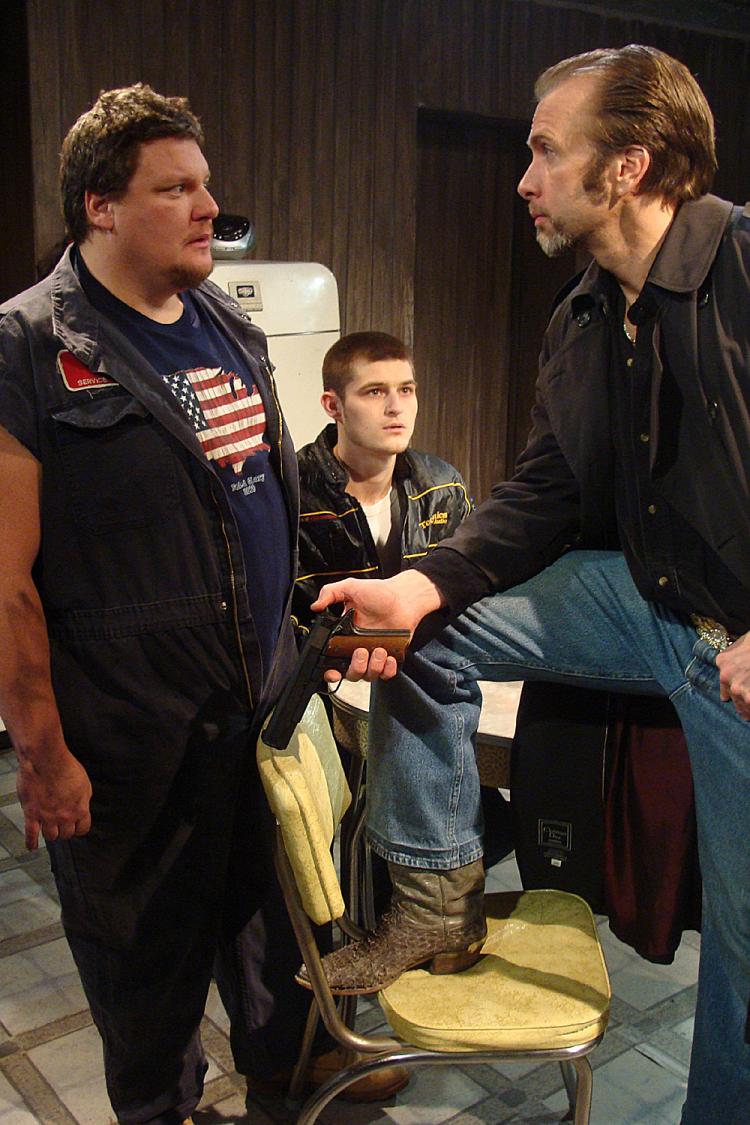Today’s Wall Street Journal drama column is the first in a series of reports about my recent visit to Chicago. This week I review Profiles Theatre’s production of Tracy Letts’ Killer Joe and the Strawdog Theatre Company’s production of Bertolt Brecht’s The Good Soul of Szechuan. Both shows were memorable. Here’s an excerpt.
* * *
No matter how unshockable you like to think you are, I expect you’ll jump at least once–and probably several times–in the course of Profiles Theatre’s scaldingly funny revival of “Killer Joe,” the play that made Tracy Letts a big name in American theater 14 years before “August: Osage County” reached Broadway.
 First performed in 1993, “Killer Joe” is a blacker-than-black comedy about a shiftless drug dealer (Kevin Bigley) who hires an obliging off-duty cop (Darrell W. Cox) to murder his mother, offering the favors of his unwitting kid sister (Claire Wellin) as a down payment on the cop’s chunk of the money from the mother’s life-insurance policy. The events that flow from this transaction, all of which take place in a grubby house trailer somewhere on the outskirts of Dallas, are portrayed with extreme explicitness, up to and including in-your-face nudity and the kind of bloodshed you might expect to see in the back room of a butcher’s shop on a busy day. If any part of that description strikes you as offputting, stay home and watch a sitcom–but you’ll be missing a fabulously well-staged production of one of the best American plays of the past quarter-century….
First performed in 1993, “Killer Joe” is a blacker-than-black comedy about a shiftless drug dealer (Kevin Bigley) who hires an obliging off-duty cop (Darrell W. Cox) to murder his mother, offering the favors of his unwitting kid sister (Claire Wellin) as a down payment on the cop’s chunk of the money from the mother’s life-insurance policy. The events that flow from this transaction, all of which take place in a grubby house trailer somewhere on the outskirts of Dallas, are portrayed with extreme explicitness, up to and including in-your-face nudity and the kind of bloodshed you might expect to see in the back room of a butcher’s shop on a busy day. If any part of that description strikes you as offputting, stay home and watch a sitcom–but you’ll be missing a fabulously well-staged production of one of the best American plays of the past quarter-century….
If you doubt that it’s possible to write a political play that is both passionate and poetic, I offer in evidence Bertolt Brecht’s “The Good Soul of Szechuan,” a parable of capitalism and its discontents that the Strawdog Theatre Company is performing with an exciting blend of fire, fantasy and irreverence.
The last of these qualities is especially important when it comes to the plays of Brecht, which are too often directed so didactically that they become stiff. Not this time: Shade Murray’s deceptively casual staging has the helter-skelter feel of a frat party whose guests have decided on the spur of the moment to put on a show. As you enter the black-box theater, a gaggle of musicians in the corner of the room are singing songs by Neil Young and Leonard Cohen. Then, almost without warning, the play gets underway, and before you know it, you’re swept up in the tale of a Chinese village whose most spiritually minded citizen is a whore with a heart of 10-karat gold (Michaela Petro, who is terrific). Shen Te has come under the scrutiny of a trio of credulous gods who decide to reward her for her goodness, thereby triggering the law of unintended consequences and bringing about a sequence of dire and farcical events that are portrayed with great gusto by Mr. Murray’s fine cast….
* * *
Read the whole thing here.
Archives for May 14, 2010
TT: Picking the winners
In Theatre, his new book, David Mamet lists his ten favorite American plays and explains why he likes them so much. The list, as I observed the other day, is full of surprises, but it’s interesting for another reason, which is that it tells the reader at least as much about Mamet himself as it does about the plays he picked. That’s almost always true of what I call “practitioner criticism,” in which a working artist doubles as a critic of the art form that he practices.
So what do we learn about the author of Glengarry Glen Ross from the fact that Our Town is his favorite American play? To find out, pick up a copy of Saturday’s Wall Street Journal and read my “Sightings” column, in which I speculate–fruitfully, I hope–on the insights that David Mamet’s top-ten list offers into his theatrical psyche.
UPDATE: Read the whole thing here.
TT: Almanac
“There is something beautiful, touching and poetic when one person loves more than the other, and the other is indifferent.”
Anton Chekhov, “After the Theatre”
